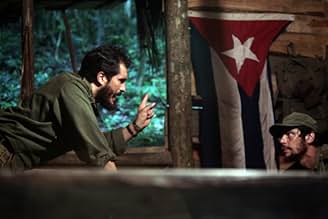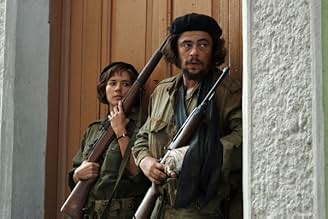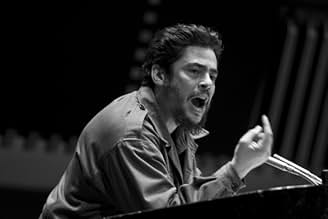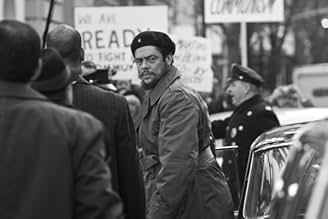AVALIAÇÃO DA IMDb
7,1/10
49 mil
SUA AVALIAÇÃO
Em 1956, Ernesto 'Che' Guevara e um bando de exilados cubanos liderados por Castro, mobilizam um exército para derrubar o regime do ditador Fulgencio Batista.Em 1956, Ernesto 'Che' Guevara e um bando de exilados cubanos liderados por Castro, mobilizam um exército para derrubar o regime do ditador Fulgencio Batista.Em 1956, Ernesto 'Che' Guevara e um bando de exilados cubanos liderados por Castro, mobilizam um exército para derrubar o regime do ditador Fulgencio Batista.
- Direção
- Roteiristas
- Artistas
- Prêmios
- 4 vitórias e 13 indicações no total
Oscar Isaac
- Interpreter
- (as Óscar Isaac)
María Isabel Díaz Lago
- María Antonia
- (as María Isabel Díaz)
Demián Bichir
- Fidel Castro
- (as Demian Bichir)
Ramon Fernandez
- Héctor
- (as Ramón Fernández)
Yul Vazquez
- Alejandro Ramírez
- (as Yul Vázquez)
Jsu Garcia
- Jorge Sotús
- (as Jsu García)
Luis Alfredo Rodríguez Sánchez
- Rebel Messenger #1
- (as Luis Rodríguez Sánchez)
Roberto Santana
- Juan Almeida
- (as Roberto Luis Santana)
- Direção
- Roteiristas
- Elenco e equipe completos
- Produção, bilheteria e muito mais no IMDbPro
Avaliações em destaque
Che: Part One felt very complete and fulfilling. I found myself looking at Ernesto "Che" Guevara as a very well rounded person. Not as an ideological self fulfilling man but as an articulate man with thought out rational decisions as well as a man with many useful talents.
The acting of the cast all around was very good but Benicio Del Toro took the movie by storm but he did this in a very subtle way. His performance displayed how Che's spirit was able to superseded the hardships faced in the Cuban Revolution. It did not display any brutality or recklessness but a devotion to a cause. Del Toro's perforations was that worthy of an Oscar nomination but I don't think Che Guervara cared to much about awards.
The directing by Steven Soderbergh was visually stunning at times with much of the scenes shot in the forest. What kept the movie upbeat though were the scenes of Che in New York giving interviews and addressing the U.N. It added an extra layer to the film allowing you to see another side of Che. The side in which he shows his political and speaking abilities. The writing was very good with the dialog always keeping you engrossed. The music, though not much of it, was very good and stayed within rhythm of the rest of the film.
Overall the film succeeds in showing Che as a well rounded man never developing into oversimplified or unnecessarily complex portrayal of a man. The movie was very accurate and refused to take on a role of being inspiring or Hollywoodish which I enjoyed. The only problem with the film I had was that it seems to have a little too much of a feel of a war film rather than a biopic. Still I highly recommend this film.
The acting of the cast all around was very good but Benicio Del Toro took the movie by storm but he did this in a very subtle way. His performance displayed how Che's spirit was able to superseded the hardships faced in the Cuban Revolution. It did not display any brutality or recklessness but a devotion to a cause. Del Toro's perforations was that worthy of an Oscar nomination but I don't think Che Guervara cared to much about awards.
The directing by Steven Soderbergh was visually stunning at times with much of the scenes shot in the forest. What kept the movie upbeat though were the scenes of Che in New York giving interviews and addressing the U.N. It added an extra layer to the film allowing you to see another side of Che. The side in which he shows his political and speaking abilities. The writing was very good with the dialog always keeping you engrossed. The music, though not much of it, was very good and stayed within rhythm of the rest of the film.
Overall the film succeeds in showing Che as a well rounded man never developing into oversimplified or unnecessarily complex portrayal of a man. The movie was very accurate and refused to take on a role of being inspiring or Hollywoodish which I enjoyed. The only problem with the film I had was that it seems to have a little too much of a feel of a war film rather than a biopic. Still I highly recommend this film.
Che Part One is an interesting and enjoyable film about the Cuban revolution, that focuses on the infamous Ernesto 'Che' Guevara. The story follows Che from his first meeting with Castro, to the climactic battle in Santa Clara, where Batista's army makes its last stand against the revolutionaries.
This battle scene is filmed guerrilla warfare style in an urban environment, with short bursts of action followed by silence as soldiers move into newer/better positions. It all feels very tense and realistic, which makes a nice change to the shaky cam explosion fests that we're used to. This style works well throughout the rest of the film but swaps the city for the jungle.
The flash forward scenes where Che is interviewed and later addresses the United Nations, help to give the story, and Che, more depth and background, whilst giving us insights into his personality and ideology. Along with the battles, these scenes also help to break up the slower parts of the film.
Cinematography in the film is good and occasionally great, with some stunning shots of the Cuban landscape. The black and white scenes are also well shot, without feeling out of place.
On another positive note, Benicio Del Toro does an excellent job portraying Che. He is understated and believable as the man who wanted to change people's lives, focused on doing what he thought was right.
Unfortunately though, I had trouble caring about or even remembering most of the other characters, as dialogue between them isn't particular memorable. Sometimes you almost feel like you're watching a documentary that's trying to teach rather than entertain and this can start to wear, especially when you're reading subtitles. Che may also be shown in a better light than some would like, although honestly I feel the film is fairly accurate in its portrayal of the man and the history.
I'd definitely recommend this film to anyone interested in Che or the events in Cuba. Even if at times things do get a little slow, it's still a rewarding and informative experience.
This battle scene is filmed guerrilla warfare style in an urban environment, with short bursts of action followed by silence as soldiers move into newer/better positions. It all feels very tense and realistic, which makes a nice change to the shaky cam explosion fests that we're used to. This style works well throughout the rest of the film but swaps the city for the jungle.
The flash forward scenes where Che is interviewed and later addresses the United Nations, help to give the story, and Che, more depth and background, whilst giving us insights into his personality and ideology. Along with the battles, these scenes also help to break up the slower parts of the film.
Cinematography in the film is good and occasionally great, with some stunning shots of the Cuban landscape. The black and white scenes are also well shot, without feeling out of place.
On another positive note, Benicio Del Toro does an excellent job portraying Che. He is understated and believable as the man who wanted to change people's lives, focused on doing what he thought was right.
Unfortunately though, I had trouble caring about or even remembering most of the other characters, as dialogue between them isn't particular memorable. Sometimes you almost feel like you're watching a documentary that's trying to teach rather than entertain and this can start to wear, especially when you're reading subtitles. Che may also be shown in a better light than some would like, although honestly I feel the film is fairly accurate in its portrayal of the man and the history.
I'd definitely recommend this film to anyone interested in Che or the events in Cuba. Even if at times things do get a little slow, it's still a rewarding and informative experience.
When it comes to biopics, there are usually two discernibly differentiated forms; the film, and the documentary. Of course, when I use the word documentary, I don't mean it literally, but rather, as a means to say that the approach its director takes it similar to those used by directors of documentaries. Che, which comes in the shadow of a recent but very different cousin W., is such a movie that exists not to entertain or provide the viewer with any personal gratification outside of historical and biographical information on its central figure and topic. Where Oliver Stone decided to take a much more light-hearted, human paintbrush to his canvas, Steven Soderbergh here uses stern, almost completely serious shades, creating an informative and compelling account of a man that became a living icon in our modern culture. So like most of those that have come before it, Che is a movie that is best appreciated under no pretence; this is a history lesson disguised as film, and while it does tell a good story, those looking for entertainment best look away.
Of course, the icon that I refer to is quite obviously Cuban revolutionist Ernesto 'Che' Guevara here played by Benicio Del Toro, a figure now embellished upon the memories of those with slightest interest in political history. If not, then you probably have his face on a t-shirt somewhere and you didn't know. Yet it doesn't matter how or why you know of Guevara before you view Che because Peter Buchman does a fine job of introducing you to him here. Plus, coupled with a performance that never begs for attention but instead simply plays the man he's supposed to be portraying with no overt padding, Del Toro goes a long way to giving Che the right amount of conviction that is needed to keep thing interesting and dynamic. Make no mistake, this is no dramatization of the man's life, so Del Toro never piles on the melodrama or anything to that degree to win over the audience, and this is reflected not only through the movie's ensemble of performances, but through the entire production itself.
Had the feature remained its original singular, five hour form however, a different opinion may have been garnered, but as it stands, the movie does well on its own merit. Part One, which details the initial struggle of the revolution of Cuba, is less about Guevara and more about his cause under the leadership of Fidel Castro. Granted, focus is shifted every now and again to set up part two's inevitable centralization upon Che himself, but for the most part, Part One remains more as a wide-angled view on the movement in which Guevara was part of. This shift in focus does well to once again distance the movie away from mere speculative entertainment and more towards the form of an educational informant. Yes, there are scenes that drag on and on, and generally some of these seem superfluous and dubious to the overall arc of the production, but for the most part, the script and direction remains coherent in its willingness to merely document rather than emote.
As a whole, Che's first half is an unassuming picture. At first glance, it isn't anything remotely special, and probably won't provide viewers with any degree of resonance if they are not interested in the man and his people's struggle beforehand, yet the same can be said for a number of similar features. Instead, I can only recommend this to those who are interested in the revolution and don't mind slow paced, attention-demanding material that does entertain from time to time, but only as a natural result of its historical importance. Again, those looking for a character piece similar to Stone's portrayal of George W. Bush last year would be wise to reevaluate their will to see Che; although titled after the man himself, and a biopic on a purely ostensible level, Che is more about his fight than the man himself. There are no real moments of personal insight here, no cathartic revelations or studies of psyche. No, instead the movie tells the facts as they were, straight from the horses mouth, and while they can sometimes work against the common desires of cinema goers' need for personal fulfillment, if digested objectively, can provide a strongly engaging, interesting and informative piece of historically significant art.
Of course, the icon that I refer to is quite obviously Cuban revolutionist Ernesto 'Che' Guevara here played by Benicio Del Toro, a figure now embellished upon the memories of those with slightest interest in political history. If not, then you probably have his face on a t-shirt somewhere and you didn't know. Yet it doesn't matter how or why you know of Guevara before you view Che because Peter Buchman does a fine job of introducing you to him here. Plus, coupled with a performance that never begs for attention but instead simply plays the man he's supposed to be portraying with no overt padding, Del Toro goes a long way to giving Che the right amount of conviction that is needed to keep thing interesting and dynamic. Make no mistake, this is no dramatization of the man's life, so Del Toro never piles on the melodrama or anything to that degree to win over the audience, and this is reflected not only through the movie's ensemble of performances, but through the entire production itself.
Had the feature remained its original singular, five hour form however, a different opinion may have been garnered, but as it stands, the movie does well on its own merit. Part One, which details the initial struggle of the revolution of Cuba, is less about Guevara and more about his cause under the leadership of Fidel Castro. Granted, focus is shifted every now and again to set up part two's inevitable centralization upon Che himself, but for the most part, Part One remains more as a wide-angled view on the movement in which Guevara was part of. This shift in focus does well to once again distance the movie away from mere speculative entertainment and more towards the form of an educational informant. Yes, there are scenes that drag on and on, and generally some of these seem superfluous and dubious to the overall arc of the production, but for the most part, the script and direction remains coherent in its willingness to merely document rather than emote.
As a whole, Che's first half is an unassuming picture. At first glance, it isn't anything remotely special, and probably won't provide viewers with any degree of resonance if they are not interested in the man and his people's struggle beforehand, yet the same can be said for a number of similar features. Instead, I can only recommend this to those who are interested in the revolution and don't mind slow paced, attention-demanding material that does entertain from time to time, but only as a natural result of its historical importance. Again, those looking for a character piece similar to Stone's portrayal of George W. Bush last year would be wise to reevaluate their will to see Che; although titled after the man himself, and a biopic on a purely ostensible level, Che is more about his fight than the man himself. There are no real moments of personal insight here, no cathartic revelations or studies of psyche. No, instead the movie tells the facts as they were, straight from the horses mouth, and while they can sometimes work against the common desires of cinema goers' need for personal fulfillment, if digested objectively, can provide a strongly engaging, interesting and informative piece of historically significant art.
- A review by Jamie Robert Ward (http://www.invocus.net)
Maybe the most refreshing thing about Che, both parts, is that its director, Steven Soderbergh, didn't know anything about Ernesto "Che" Guevara before taking on the project. This is like a good few in the audience, like yours truly. I didn't know much at all about Che except that he was involved with communist uprisings and revolutions, was buddy-buddy with Castro, and died in execution-style as a guerrilla (that, and his image appears on t-shirts everywhere). What Soderbergh provides for an audience that will go to see it for what he will do with the project- and what Benicio Del-Toro does with the character- is that it's a history lesson made vibrant and urgent and passionate and, according to the director in interviews and Q & A's, honest portrayal of events.
If this means that we may not get exactly a fully rounded portrait of its titular protagonist/hero, then that's probably the only real liability that the picture has. Maybe, perhaps, rightfully so; Che wasn't a guy, at least in his prime revolutionary years, to be one that had much warmth or moments of doubt (and if he had them, they were behind closed doors and out of any record of diaries). So what we get in Part 1, the conventional "Rise" of the character in the story, is the tale of how to do a revolution right- or rather, how to take over a government by military force, and it's Che as a man who pretty quickly becomes a natural leader, a stern taskmaster and also someone who "loves" as a revolutionary must, Che says.
It's gripping film-making nevertheless, with Soderbergh commanding the narrative wonderfully between a color-filmed part-digital-part-35mm Red-camera on the 1957-1959 events in Cuba and the 1964 trip to the UN in New York filmed in grainy black and white. What we get is part documentary and part bio-pic, words straight from the guerrilla's mouth, as it were, and the events that led up to the take-over (which serves as the climax of the picture) in Santa Clara, Cuba. Some of the elements, as noted, are conventional of just a war picture: we get the young kids (16 and 14) who will do anything to fight with Guevara and his group; we get the supposed love interest, only (thankfully) muted with only one scene with small talk; and we get the moments of enthusiasm, humor, camaraderie, and unlikely bravery in the heat of battle.
But most importantly we see Benicio del-Toro take command of this role like he does seemingly often but rarely with such force. In fact, he probably elevates this Che past some possible pit-falls (this project was actually his baby, as he serves as co-producer and developed the project for years), and makes him as human as he can be, using Che's health-tic (asthma) to its fullest, and reveling in going for broke as far as gusto and revelation go. For all of Soderbergh's command of the film-making style- most of all, for me, during the climactic battle where we get to see him awesomely direct a battle sequence- del-Toro, for any scene he's in, steals the show. If for nothing else, whatever your political stance or thoughts on Che, he's worth the admission. 8.5/10
If this means that we may not get exactly a fully rounded portrait of its titular protagonist/hero, then that's probably the only real liability that the picture has. Maybe, perhaps, rightfully so; Che wasn't a guy, at least in his prime revolutionary years, to be one that had much warmth or moments of doubt (and if he had them, they were behind closed doors and out of any record of diaries). So what we get in Part 1, the conventional "Rise" of the character in the story, is the tale of how to do a revolution right- or rather, how to take over a government by military force, and it's Che as a man who pretty quickly becomes a natural leader, a stern taskmaster and also someone who "loves" as a revolutionary must, Che says.
It's gripping film-making nevertheless, with Soderbergh commanding the narrative wonderfully between a color-filmed part-digital-part-35mm Red-camera on the 1957-1959 events in Cuba and the 1964 trip to the UN in New York filmed in grainy black and white. What we get is part documentary and part bio-pic, words straight from the guerrilla's mouth, as it were, and the events that led up to the take-over (which serves as the climax of the picture) in Santa Clara, Cuba. Some of the elements, as noted, are conventional of just a war picture: we get the young kids (16 and 14) who will do anything to fight with Guevara and his group; we get the supposed love interest, only (thankfully) muted with only one scene with small talk; and we get the moments of enthusiasm, humor, camaraderie, and unlikely bravery in the heat of battle.
But most importantly we see Benicio del-Toro take command of this role like he does seemingly often but rarely with such force. In fact, he probably elevates this Che past some possible pit-falls (this project was actually his baby, as he serves as co-producer and developed the project for years), and makes him as human as he can be, using Che's health-tic (asthma) to its fullest, and reveling in going for broke as far as gusto and revelation go. For all of Soderbergh's command of the film-making style- most of all, for me, during the climactic battle where we get to see him awesomely direct a battle sequence- del-Toro, for any scene he's in, steals the show. If for nothing else, whatever your political stance or thoughts on Che, he's worth the admission. 8.5/10
It helps to know that this was originally brought to life as a Terrence Malick screenplay about Che's disastrous forray in Bolivia. Financing fell through and Soderbergh stepped in to direct. He conceived a first part and shot both back to back as one film trailing Che's rise and fall.
He retained however what I believe would be Malick's approach: no politics and a just visual poem about the man behind the image, exhaustive as the horrible slog through Cuban jungles and windswept Andean plateaus must have been. Malick applied this to his New World that he abandoned Che for, lyrical many times over.
But Soderbergh being an ambitious filmmaker, he puzzled over this a little more. Here was a man of action at the center of many narratives about him, some fashioned by himself, conflictingly reported as iconic revolutionary or terrorist, charismatic leader or ruthless thug, erudite Marxist thinker or brutal soldier.
So how to visually exemplify this contradicting ethos as our film about him? And how to arrange a world around this person in such a way as to absorb him whole, unfettered from narrative - but writing it as he goes along - off camera - but ironically on - and as part of that world where narratives are devised to explain him. As flesh and bones, opposed to a cutout from a history book.
One way to do this, would be via Brecht and artifice. The Korda photograph would reveal lots, how we know people from images, how we build narratives from them. Eisenstein sought the same in a deeper way, coming up with what he termed the 'dialectical montage': a world assembled by the eye, and in such ways as the eye aspires to create it.
So what Soderbergh does, is everything by halves: a dialectic between two films trailing opposite sides of struggle, glory and failure, optimism and despair. Two visual palettes, two points of view in the first film, one in the presence of cameras hoping to capture the real person, the other were that image was being forged in action.
The problem, is of course that Brecht and Eisenstein made art in the hope to change the world, to awaken consciousness, Marxist art with its trappings. By now we have grown disillusioned with the idea, and Soderbergh makes no case and addresses no present struggles.
But we still have the cinematic essay about all this.
The first part: a narrative broadcast from real life, meant to reveal purpose, ends, revolution. The second part: we get to note in passing a life that is infinitely more expansive than any story would explain, more complex, beautiful, frustrating, and devoid of any apparent purpose other than what we choose as our struggle, truly a guerilla life.
I imagine a tremendous film from these notions. Just notice the remarkable way Part 2 opens. Che arrives at Bolivia in disguise, having shed self and popular image. No longer minister, spokesman, diplomat, guerilla, he is an ordinary man lying on a hotel bed, one among many tourists. Life could be anything once more, holds endless possibility. Cessation.
What does he do? He begins to fashion the same narrative as before, revolution again. Chimera this time. Transient life foils him in Bolivia. Instead of changing the world once more, he leaves behind a story of dying for it. We have a story about it as our film, adding to the rest.
He retained however what I believe would be Malick's approach: no politics and a just visual poem about the man behind the image, exhaustive as the horrible slog through Cuban jungles and windswept Andean plateaus must have been. Malick applied this to his New World that he abandoned Che for, lyrical many times over.
But Soderbergh being an ambitious filmmaker, he puzzled over this a little more. Here was a man of action at the center of many narratives about him, some fashioned by himself, conflictingly reported as iconic revolutionary or terrorist, charismatic leader or ruthless thug, erudite Marxist thinker or brutal soldier.
So how to visually exemplify this contradicting ethos as our film about him? And how to arrange a world around this person in such a way as to absorb him whole, unfettered from narrative - but writing it as he goes along - off camera - but ironically on - and as part of that world where narratives are devised to explain him. As flesh and bones, opposed to a cutout from a history book.
One way to do this, would be via Brecht and artifice. The Korda photograph would reveal lots, how we know people from images, how we build narratives from them. Eisenstein sought the same in a deeper way, coming up with what he termed the 'dialectical montage': a world assembled by the eye, and in such ways as the eye aspires to create it.
So what Soderbergh does, is everything by halves: a dialectic between two films trailing opposite sides of struggle, glory and failure, optimism and despair. Two visual palettes, two points of view in the first film, one in the presence of cameras hoping to capture the real person, the other were that image was being forged in action.
The problem, is of course that Brecht and Eisenstein made art in the hope to change the world, to awaken consciousness, Marxist art with its trappings. By now we have grown disillusioned with the idea, and Soderbergh makes no case and addresses no present struggles.
But we still have the cinematic essay about all this.
The first part: a narrative broadcast from real life, meant to reveal purpose, ends, revolution. The second part: we get to note in passing a life that is infinitely more expansive than any story would explain, more complex, beautiful, frustrating, and devoid of any apparent purpose other than what we choose as our struggle, truly a guerilla life.
I imagine a tremendous film from these notions. Just notice the remarkable way Part 2 opens. Che arrives at Bolivia in disguise, having shed self and popular image. No longer minister, spokesman, diplomat, guerilla, he is an ordinary man lying on a hotel bed, one among many tourists. Life could be anything once more, holds endless possibility. Cessation.
What does he do? He begins to fashion the same narrative as before, revolution again. Chimera this time. Transient life foils him in Bolivia. Instead of changing the world once more, he leaves behind a story of dying for it. We have a story about it as our film, adding to the rest.
Você sabia?
- CuriosidadesFor his role, Benicio Del Toro spent seven years researching Guevara's life.
- Erros de gravaçãoWhen the guerrilleros are in the Sierra Maestra, we can hear the coqui (Eleutherodactylus coqui) singing in the night. However, this small frog is endemic to Puerto Rico and the Virgin Islands, thus not possible to be heard in Cuba.
- Citações
Lisa Howard: What is the most important quality for a revolutionary to possess?
Ernesto Che Guevara: El amor.
Cuban Diplomat #1: [translating] Love.
Lisa Howard: Love?
Cuban Diplomat #1: Love of humanity... of justice and truth. A real revolutionary goes where he is needed.
- ConexõesFeatured in Así se hizo - Che El Argentino (2008)
- Trilhas sonorasBasura
Written and Performed by Mark A. Mangini (as Mark Mangini)
Principais escolhas
Faça login para avaliar e ver a lista de recomendações personalizadas
Detalhes
Bilheteria
- Orçamento
- US$ 35.000.000 (estimativa)
- Faturamento bruto nos EUA e Canadá
- US$ 748.555
- Fim de semana de estreia nos EUA e Canadá
- US$ 61.070
- 14 de dez. de 2008
- Faturamento bruto mundial
- US$ 34.209.066
- Tempo de duração
- 2 h 14 min(134 min)
- Cor
- Mixagem de som
- Proporção
- 2.39 : 1
Contribua para esta página
Sugerir uma alteração ou adicionar conteúdo ausente






























